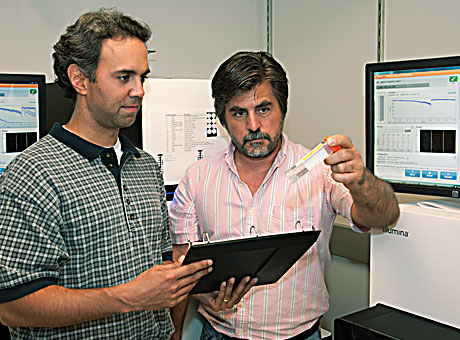
Robi D. Mitra, PhD, left, and Seth D. Crosby, MD, are key players in the Genome Technology Access Center.

Robi D. Mitra, PhD, left, and Seth D. Crosby, MD, are key players in the Genome Technology Access Center.
St. Louis-area scientists now have easy local access to sophisticated technology to decode and analyze the genomes of patients and organisms in research studies.
The Department of Genetics at Washington University School of Medicine has established the Genome Technology Access Center (GTAC) to offer high-speed genome sequencing and other advanced genetic technologies to scientists both within and beyond the university.
In recent years, genomics has revolutionized the field of biology, but the technology has remained out of reach for many laboratories.
That’s because DNA sequencing machines cost hundreds of thousands of dollars, making them unaffordable for individual labs. Moreover, many scientists don’t have the expertise to analyze the terabytes of genomic data produced by sequencing.
“DNA sequencing has become the go-to technology in many fields,” says Jeffrey Milbrandt, MD, PhD, the James S. McDonnell Professor of Genetics and head of the genetics department. “But not every scientist has the specialized training to prepare DNA samples, analyze the data and interpret the results. We saw a real need to fill these gaps and to expand access to the technology.”
Robi D. Mitra, PhD, associate professor of genetics, has been a driving force behind the new center, which is staffed by nearly 20 scientists, including geneticists, molecular biologists and informatics specialists, who have the expertise to prepare DNA samples for sequencing and to analyze and interpret the data.
The new center can handle both small and large projects; its services are offered to scientists on a fee-for-service basis. Scientists also can choose to prepare their own DNA samples or analyze the raw genomic data if they prefer.
“We have the full range of technologies needed to perform genetic analyses,” says Seth D. Crosby, MD, center director and research assistant professor of genetics. “Scientists don’t have to know the details of a particular technology. We can walk them through the various options and help them select the best one based on the research questions they want to answer.”